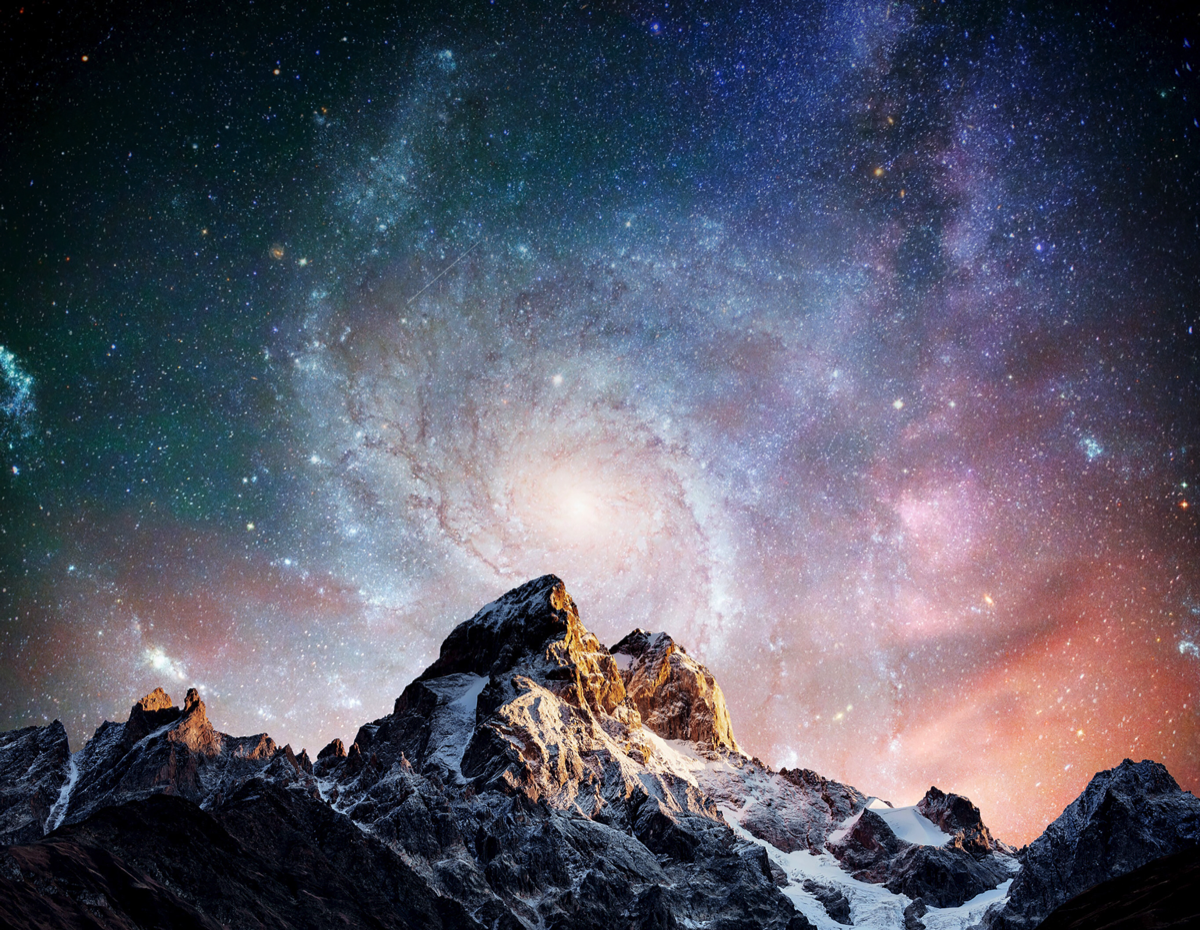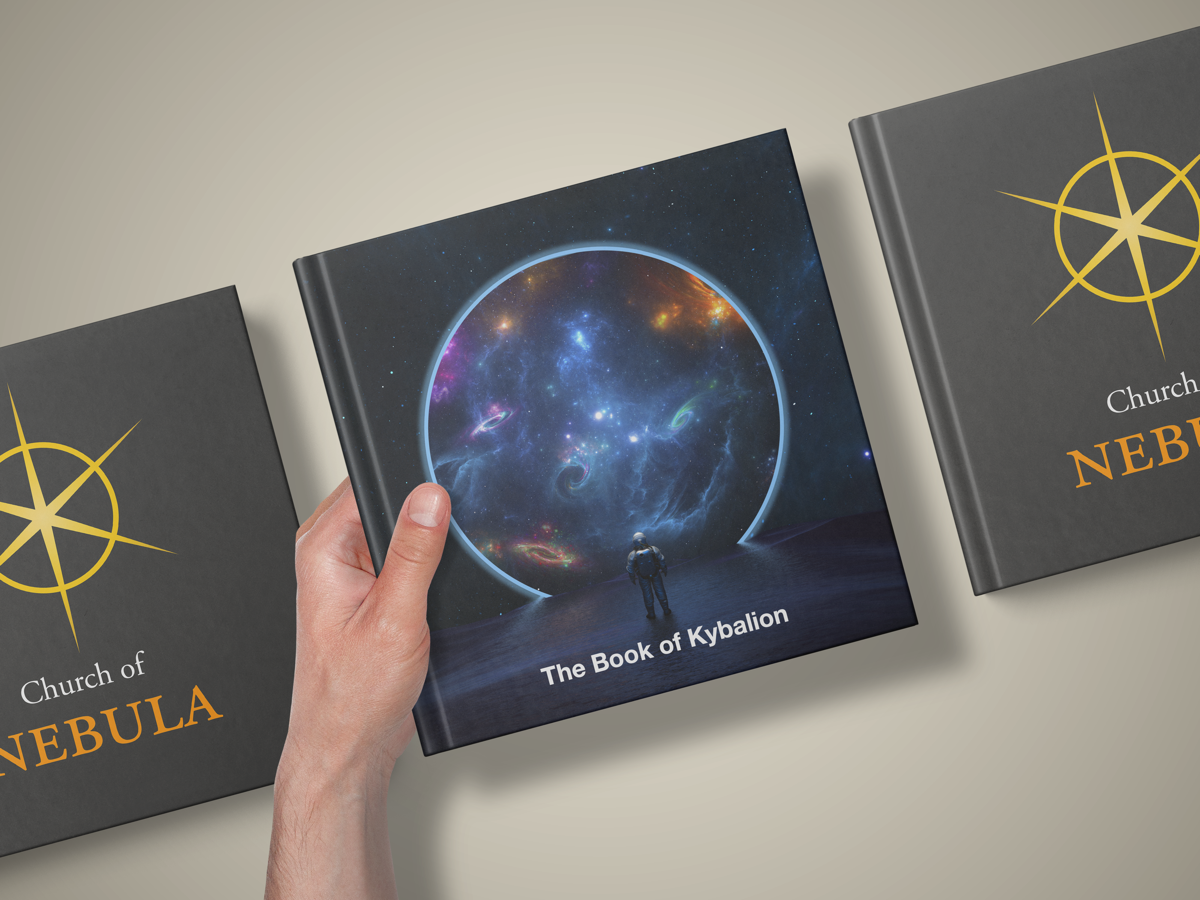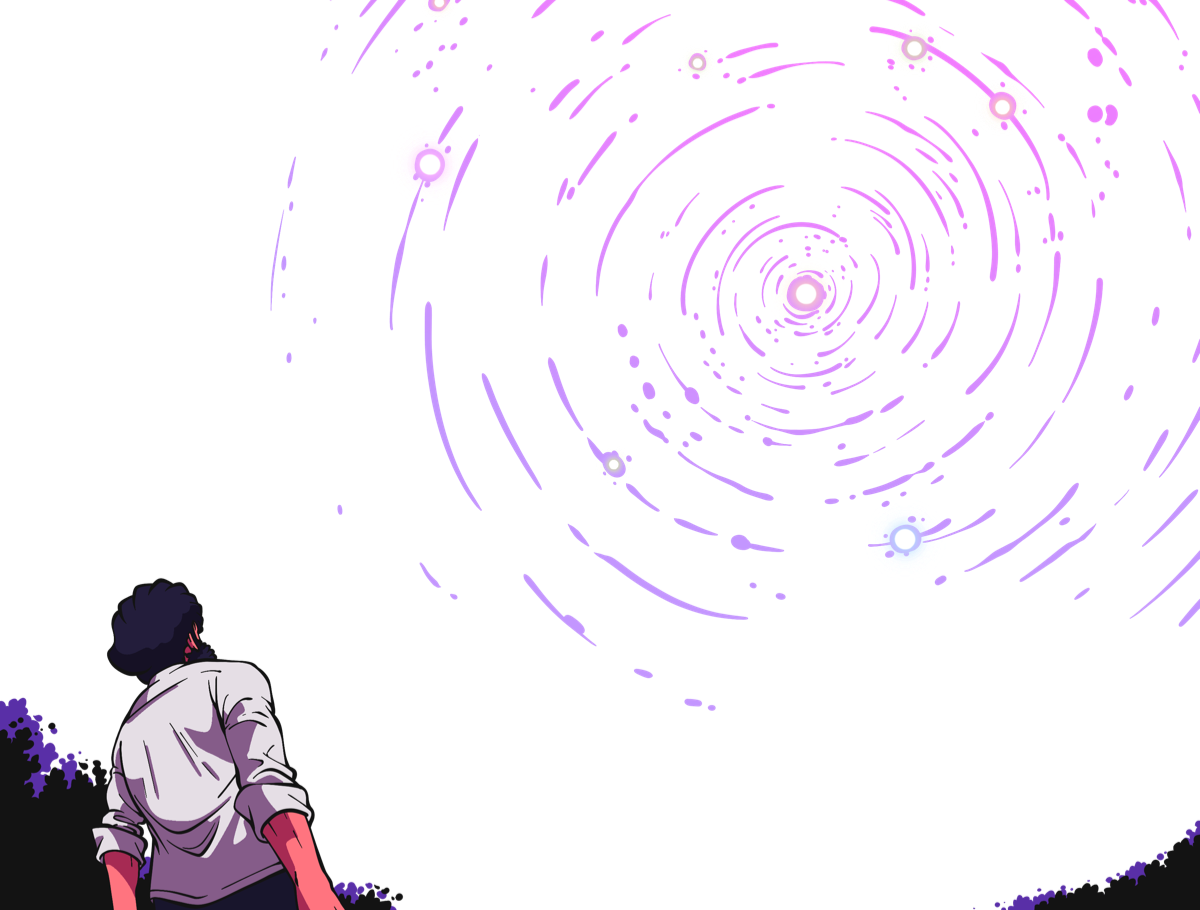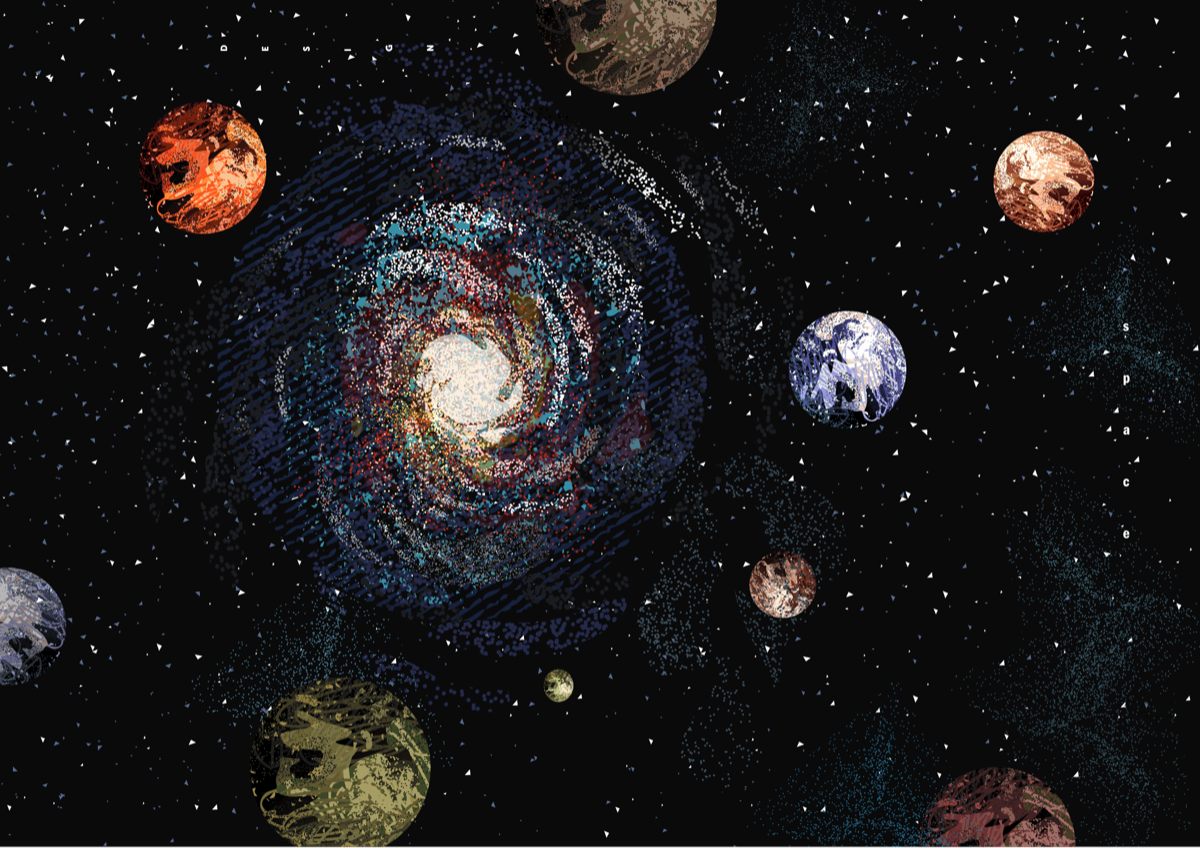
The Nebula Doctrine
In the Church of Nebula, our doctrine centers on a transformative belief: the universe is a living, breathing entity, marked by a dynamic energy that interconnects all forms of life. This fundamental understanding shapes our view of existence, aligning us with the rhythm of a cosmos that is ever-evolving, ever-changing.
We recognize that this universal energy manifests through four primary dimensions: physical, mental, emotional, and spiritual. These are not separate entities but deeply interconnected facets of existence, each contributing to the cosmic tapestry. Within this framework, we see a divine spark within all living beings, a testament to the potential for achieving heightened states of consciousness and understanding. This recognition of the divine within calls for a deep respect for life in all its forms, encouraging a stance of care and reverence.
At the core of the Church of Nebula’s doctrine is a call to explore the sacredness of life and to awaken to the mysteries of the universe. Through this exploration, we are invited to embrace our role as part of a greater whole, fostering a deep sense of unity and purpose. This journey offers not only a deeper understanding of the cosmos but also a pathway to personal and collective transformation.

Energy
The universal force that controls the entire universe. This entity is called ‘Zella’.

Gates of Hell
The three gates to the self-destructive hell: lust, anger, and greed. Renounce these three.

Karma
No one who does good work will ever come to a bad end, either here or in the world to come.

Maya
The entire universe is a dream, an illusion (simulation).

Duty
Do your duty with discipline and devotion.

Soul
The Soul is reborn based on your karmic actions.

Charity
Helping the poor and needy. Always do it with the welfare of others in mind.
Think of Zella as the cosmic energy that binds us all. It doesn't matter which path you take; Zella's light shines on everyone. We're all travelers, figuring out our own way to reach the stars."

The Open Theology of the Church of Nebula
The Church of Nebula offers a unique and evolving spiritual path that blends elements of traditional religions with a modern, open-minded approach. Here's a breakdown of their core theological concepts:
Zella: Central to Nebula's belief system is Zella, the all-encompassing energy or consciousness of the universe. It's not a personal God in the traditional sense, but rather a unifying force that connects everything.
Karma and Rebirth: The Church of Nebula incorporates the concept of karma, the law of cause and effect, from Eastern traditions. We believe our actions in this life have consequences, influencing our future experiences. This aligns with the idea of rebirth, similar to Buddhist teachings on reincarnation. Each life offers an opportunity to learn, grow, and improve our karma.
Personal Exploration and Growth: The Church of Nebula emphasizes the importance of individual exploration in your spiritual journey. We encourage questioning, reflection, and finding practices that resonate with you. The focus is on personal growth and transformation, becoming a better version of yourself through mindfulness and self-discovery.
Openness and Inclusivity: The Church of Nebula embraces a welcoming and inclusive approach to spirituality. We don't promote a rigid set of doctrines or beliefs. Instead, we encourage members to explore various spiritual traditions and find what brings them meaning. This open-mindedness allows individuals from diverse backgrounds to connect and share their experiences.
Connection with the Universe: Nebula encourages practices that foster a deeper connection with Zella, the universal energy. This might involve meditation, spending time in nature, or any activity that brings you a sense of peace and connection to something larger than yourself.
Evolving Theology: The Church of Nebula views theology as a work in progress. We believe new discoveries and insights can contribute to a richer understanding of the universe and our place within it.

Can you explain to me in simple terms please!
Alright, buckle up because we're diving into the heart of the Church of Nebula – its theology! Forget stuffy religious doctrines, here we're all about exploration and finding your own truth.
First things first, there's Zella. Think of it as the universe's big bang of energy, the all-encompassing consciousness that binds everything together. It's not your grandpa's God with a beard, but more of a unifying force. We also borrow some wisdom from the East. Karma, that whole "what goes around comes around" thing, is a big deal here. Your choices in this life impact your future experiences. And speaking of the future, rebirth is a possibility! Kinda like a cosmic do-over to learn from your mistakes and become a better you.
But the coolest part? You get to chart your own spiritual course. We encourage you to ask questions, meditate, explore different traditions – whatever helps you connect with something bigger than yourself. It's all about personal growth, becoming the best version of you through mindfulness and self-discovery.
Here at the Church of Nebula, we're a big family, a welcoming bunch from all walks of life. We don't judge your beliefs, instead, we celebrate the journey. Plus, we're always open to new ideas! We believe our understanding of the universe is constantly evolving, just like us.
So, if you're searching for meaning and a supportive community that lets you explore your own path, the Church of Nebula might be your cosmic calling!
First things first, there's Zella. Think of it as the universe's big bang of energy, the all-encompassing consciousness that binds everything together. It's not your grandpa's God with a beard, but more of a unifying force. We also borrow some wisdom from the East. Karma, that whole "what goes around comes around" thing, is a big deal here. Your choices in this life impact your future experiences. And speaking of the future, rebirth is a possibility! Kinda like a cosmic do-over to learn from your mistakes and become a better you.
But the coolest part? You get to chart your own spiritual course. We encourage you to ask questions, meditate, explore different traditions – whatever helps you connect with something bigger than yourself. It's all about personal growth, becoming the best version of you through mindfulness and self-discovery.
Here at the Church of Nebula, we're a big family, a welcoming bunch from all walks of life. We don't judge your beliefs, instead, we celebrate the journey. Plus, we're always open to new ideas! We believe our understanding of the universe is constantly evolving, just like us.
So, if you're searching for meaning and a supportive community that lets you explore your own path, the Church of Nebula might be your cosmic calling!
Don't be afraid to ask questions! The universe has a lot to tell us, but it whispers, not shouts. Open your heart, listen closely, and you'll start to hear its secrets.

This is a fantastic book and pretty much explains what is wrong with our so called modern society!
Gates of Hell
The concept of the "Gates of Hell," poetically termed as the "Doorway to Disaster," stands as a profound caution within the spiritual discourse of the Bhagavad Gita, an esteemed scripture in Hindu philosophy. This metaphorical framework identifies lust, anger, and greed as the three catastrophic portals that lead beings towards moral and spiritual degradation, marking them as the roots of all human suffering and self-destructive tendencies. The wisdom of the Bhagavad Gita illuminates the path away from these gates, suggesting renunciation as the means for liberation.
Lust, within this context, transcends mere sexual desire, encompassing a broader spectrum of unbridled cravings for physical pleasure and gratification. It represents an obsessive pursuit of sensory satisfaction, often at the expense of ethical considerations and spiritual growth. This gate tempts individuals with the illusion of happiness through external pleasures, diverting them from the inward journey towards lasting contentment.
Anger, the second gate, is characterized by intense feelings of hostility and displeasure. It arises from unmet expectations, perceived injustices, or threats to one's ego or possessions. Anger disrupts the mind's tranquility, leading to clouded judgments and actions that often exacerbate suffering for oneself and others. It acts as a formidable barrier to understanding and compassion, essential qualities for spiritual advancement.
Greed, the final gate, epitomizes the insatiable desire to accumulate more wealth, power, or possessions than necessary. It is fueled by a deep-seated sense of lack or insecurity, leading individuals to prioritize material gain over spiritual values. Greed blinds the soul to the abundance of the present moment and to the interconnectedness of all life, fostering isolation instead of unity.
The Bhagavad Gita's counsel to renounce these three destructive forces suggests a path of conscious self-regulation and spiritual discipline. Renunciation does not imply a life devoid of pleasure, ambition, or possessions; rather, it calls for a disciplined approach to life's worldly aspects, ensuring they do not overshadow one's spiritual objectives. By recognizing the transient nature of external gratifications and redirecting focus towards righteousness, truth, and contentment, individuals can navigate away from the gates of hell towards liberation.
Achieving this state of transcendence requires vigilant self-awareness and a commitment to spiritual practices that foster inner peace and purity. Through meditation, selfless service, and devotion, one cultivates the qualities necessary to withstand the allure of lust, anger, and greed. This process of inner transformation leads to a profound understanding of the self and the universe, unveiling the intrinsic joy and freedom that lie beyond the gates of hell.
Can you explain to me in simple terms please!
Have you ever heard of the Bhagavad Gita? It's this awesome Hindu scripture packed with wisdom. One key lesson it teaches is about avoiding the "Doorway to Disaster," which sounds way cooler than "Gates of Hell," right?
Here's the deal: the Bhagavad Gita warns us about three big troublemakers – lust, anger, and greed. These are like dark alleys that lead to suffering and a whole lot of bad decisions.
Lust is more than just wanting that fancy new gadget. It's about being obsessed with pleasures that fade away fast. It distracts you from finding true happiness, the kind that lasts. Anger is that boiling rage that clouds your judgment. It makes you lash out and hurt yourself and others. Not exactly a recipe for peace, is it? Greed is that insatiable monster whispering in your ear, telling you to hoard more and more stuff. It makes you feel empty inside, even if you're surrounded by possessions.
So, the Bhagavad Gita says, "Hey, ditch these three bad boys!" But it doesn't mean you can't have fun or strive for your goals. It's about finding balance. Don't let worldly desires take over your spiritual journey. The Bhagavad Gita suggests "renunciation," which isn't about becoming a hermit. It's about enjoying life without letting it control you. Focus on what's truly important – kindness, truth, and inner peace.
Think of it like this: by steering clear of those dark alleys, you'll find a path to freedom and happiness. It takes work, sure. Meditation, helping others, and connecting with something bigger than yourself – these are the tools to unlock inner peace and leave the "Doorway to Disaster" far behind.
Here's the deal: the Bhagavad Gita warns us about three big troublemakers – lust, anger, and greed. These are like dark alleys that lead to suffering and a whole lot of bad decisions.
Lust is more than just wanting that fancy new gadget. It's about being obsessed with pleasures that fade away fast. It distracts you from finding true happiness, the kind that lasts. Anger is that boiling rage that clouds your judgment. It makes you lash out and hurt yourself and others. Not exactly a recipe for peace, is it? Greed is that insatiable monster whispering in your ear, telling you to hoard more and more stuff. It makes you feel empty inside, even if you're surrounded by possessions.
So, the Bhagavad Gita says, "Hey, ditch these three bad boys!" But it doesn't mean you can't have fun or strive for your goals. It's about finding balance. Don't let worldly desires take over your spiritual journey. The Bhagavad Gita suggests "renunciation," which isn't about becoming a hermit. It's about enjoying life without letting it control you. Focus on what's truly important – kindness, truth, and inner peace.
Think of it like this: by steering clear of those dark alleys, you'll find a path to freedom and happiness. It takes work, sure. Meditation, helping others, and connecting with something bigger than yourself – these are the tools to unlock inner peace and leave the "Doorway to Disaster" far behind.

Energy
Spiritual energy, often regarded as the quintessence of the universe, permeates every aspect of our existence. This divine essence is celebrated as the wellspring of limitless creative power, a source of profound healing, and the pillar upon which our spiritual evolution rests. It is this mystical force that binds the fabric of the universe together, connecting all forms of life and matter in an intricate dance of existence.
At the heart of spiritual practices across various traditions lies the belief that this universal energy is not only omnipresent but also accessible to humanity. Individuals are thought to possess the innate capability to attune themselves to this cosmic energy, thereby unlocking potential for transformative growth, healing, and enlightenment. The journey toward harnessing this spiritual energy often begins with the individual's quest for deeper self-awareness and a longing to connect with something greater than themselves.
Meditation, mindfulness, and prayer serve as conduits through which we can forge a profound connection with the universe's spiritual energy. These practices invite stillness and introspection, allowing us to peel away the layers of our worldly existence and tap into our higher consciousness. In these moments of deep communion, the veils between the physical and spiritual realms thin, enabling us to draw upon the universe's boundless energy. This connection is not exclusive or reserved for the few; it is a universal birthright, accessible to all who seek it with an open heart and genuine intent.
Embarking on this spiritual journey opens up myriad possibilities for personal transformation. By aligning our energy with the divine essence of the universe, we can begin to manifest our deepest intentions and desires, turning thoughts and dreams into reality. This process, however, is not merely about achieving personal gains; it is an opportunity to contribute positively to the world around us. The spiritual energy of the universe, when channeled with purpose and love, holds the power to heal—both ourselves and others—and to catalyze profound change and growth.
The act of tapping into the spiritual energy of the universe also paves the way for enlightenment, a state of being wherein we recognize our intrinsic oneness with all that exists. In this heightened state of consciousness, the illusions of separation dissolve, revealing the underlying unity of the cosmos. We come to understand that by nurturing our connection to the universe's energy, we not only elevate ourselves but also contribute to the collective elevation of humanity.
Accessing and utilizing the spiritual energy of the universe is a sacred journey of discovery, healing, and unity. It invites us to explore the depths of our being, to transcend the limitations of our physical existence, and to embrace the infinite possibilities that arise from aligning with the divine. In doing so, we open ourselves to a life enriched with purpose, harmony, and profound spiritual fulfillment.
Can you explain to me in simple terms please!
Ever felt that there's more to this world than meets the eye? That amazing feeling – that's what some call spiritual energy, the universe's hidden superpower!
Think of it as the lifeblood of everything, the source of creativity, healing, and growth. It's like the invisible thread that connects all living things, a cosmic dance we're all part of. The coolest part? You can tap into it! That's the core of many spiritual practices – learning to tune in to this universal energy and unlock your amazing potential. Maybe you're seeking deeper self-awareness, a connection to something bigger.
Meditation, mindfulness, even prayer – these are like pathways to connect with this cosmic energy. Imagine peeling back the layers of your everyday life, quieting your mind, and reaching a deeper level of consciousness. In those moments, the physical and spiritual realms seem closer, and you can access this boundless energy. And guess what? It's not a secret club! Anyone can do it, as long as you're open-minded and ready to explore.
So, what can you do with this newfound connection? Well, buckle up! By aligning your energy with the universe, you can actually manifest your desires, turn dreams into reality. Plus, it's not just about you! This energy, when used with love and purpose, can heal yourself and others, creating positive change.
The ultimate goal? Enlightenment! That's when you realize you're one with everything, the separation melts away, and you see the beautiful unity of the cosmos. By nurturing this connection, you not only elevate yourself but also contribute to the growth of humanity as a whole.
Tapping into spiritual energy is a wild ride of discovery, healing, and connection. It's about exploring your inner self, breaking free from limitations, and embracing the endless possibilities that come with aligning with the universe's divine energy. Ready to embark on this journey of purpose, harmony, and profound fulfillment? Let's go!
Think of it as the lifeblood of everything, the source of creativity, healing, and growth. It's like the invisible thread that connects all living things, a cosmic dance we're all part of. The coolest part? You can tap into it! That's the core of many spiritual practices – learning to tune in to this universal energy and unlock your amazing potential. Maybe you're seeking deeper self-awareness, a connection to something bigger.
Meditation, mindfulness, even prayer – these are like pathways to connect with this cosmic energy. Imagine peeling back the layers of your everyday life, quieting your mind, and reaching a deeper level of consciousness. In those moments, the physical and spiritual realms seem closer, and you can access this boundless energy. And guess what? It's not a secret club! Anyone can do it, as long as you're open-minded and ready to explore.
So, what can you do with this newfound connection? Well, buckle up! By aligning your energy with the universe, you can actually manifest your desires, turn dreams into reality. Plus, it's not just about you! This energy, when used with love and purpose, can heal yourself and others, creating positive change.
The ultimate goal? Enlightenment! That's when you realize you're one with everything, the separation melts away, and you see the beautiful unity of the cosmos. By nurturing this connection, you not only elevate yourself but also contribute to the growth of humanity as a whole.
Tapping into spiritual energy is a wild ride of discovery, healing, and connection. It's about exploring your inner self, breaking free from limitations, and embracing the endless possibilities that come with aligning with the universe's divine energy. Ready to embark on this journey of purpose, harmony, and profound fulfillment? Let's go!

Karma
Karma, a pivotal concept ingrained in various religions and spiritual traditions, functions as a universal principle governing the moral compass of the universe. It encapsulates the profound truth that every action undertaken by an individual casts ripples through the fabric of existence, setting in motion a chain of cause and effect. This invisible, yet inexorable, law ensures that every choice, every deed—no matter how insignificant it might seem—carries with it a consequence that aligns with the nature of the action itself.
At its core, karma serves as a cosmic ledger, a metaphysical accounting of one's deeds, where actions are neither arbitrarily rewarded nor punished but are instead met with outcomes that directly correspond to their inherent qualities. This system of moral causality champions the notion of ethical responsibility, positing that positive, virtuous actions foster beneficial outcomes, while negative, harmful behaviors invite adverse effects. Karma, therefore, is not punitive but educative, aiming not to condemn but to guide individuals towards self-improvement and ethical living.
Viewed through the lens of justice, karma embodies the principles of fairness and balance. It reassures individuals that the universe operates on a foundation of moral order, where good deeds do not go unrecognized and wrongdoing does not go unchecked. This cosmic equilibrium assures us that, in the grand scheme of existence, there is an inherent accountability that transcends human-made legal systems and societal norms.
The concept of karma also cultivates mindfulness and ethical deliberation. It encourages individuals to reflect on their actions, to consider the short-term and long-term effects of their choices, and to act with compassion and wisdom. In doing so, it fosters a collective consciousness that prioritizes harmony, benevolence, and the welfare of all beings. This emphasis on ethical conduct and the pursuit of goodness not only cultivates individual virtue but also contributes to the betterment of society as a whole.
Furthermore, karma underscores the interconnectedness of all life. It reveals how individual actions can influence the broader web of existence, reminding us that we are part of a larger, intricate system where our choices impact not just our own lives but also those around us and the environment we inhabit. This realization fosters a sense of communal responsibility and solidarity, prompting us to act with consideration for the well-being of others and the planet.
In essence, karma is a profound reminder of the power of our actions and the importance of living a life anchored in ethical principles. It is a guiding force that encourages us to navigate the complexities of life with integrity, compassion, and a deep awareness of the consequences of our actions. As such, karma not only shapes our individual destinies but also molds the collective fate of humanity, steering us towards a more just, harmonious, and enlightened existence.
Can you explain to me in simple terms please!
Ever heard of karma? It's not just a word people throw around after someone stubs their toe. It's a big cosmic idea ingrained in many religions and spiritual traditions.
Think of it as the universe's way of keeping things fair. Every action you take, big or small, has a ripple effect. Do something good, good things tend to come back your way. Do something not-so-good, well, you get the picture.
Karma isn't about punishment, though. It's more like a cosmic teacher. It shows you the results of your actions, good or bad, so you can learn and grow. It's like a giant cosmic report card, except instead of grades, you get life experiences! Here's the cool part: karma promotes fairness. The universe doesn't play favorites. Good deeds get noticed, and bad ones have consequences. This balance is important because it reminds us that even when no one's watching, there's a kind of cosmic justice at play.
Karma also makes you think before you act. It encourages you to consider how your choices affect not just yourself but also the people around you. It's like a nudge towards kindness, compassion, and thinking about the bigger picture.
Remember, we're all connected. What you do matters, not just for you, but for the whole world. Kind of like a butterfly effect, your actions can have ripples that reach far and wide. So, by choosing good, you contribute to a better world for everyone.
In the end, karma is a reminder that our actions have weight. It encourages us to live with integrity, compassion, and a deep understanding of how our choices shape our lives and the lives of others. It's like a cosmic nudge towards a more just, harmonious, and awesome existence for all!
Think of it as the universe's way of keeping things fair. Every action you take, big or small, has a ripple effect. Do something good, good things tend to come back your way. Do something not-so-good, well, you get the picture.
Karma isn't about punishment, though. It's more like a cosmic teacher. It shows you the results of your actions, good or bad, so you can learn and grow. It's like a giant cosmic report card, except instead of grades, you get life experiences! Here's the cool part: karma promotes fairness. The universe doesn't play favorites. Good deeds get noticed, and bad ones have consequences. This balance is important because it reminds us that even when no one's watching, there's a kind of cosmic justice at play.
Karma also makes you think before you act. It encourages you to consider how your choices affect not just yourself but also the people around you. It's like a nudge towards kindness, compassion, and thinking about the bigger picture.
Remember, we're all connected. What you do matters, not just for you, but for the whole world. Kind of like a butterfly effect, your actions can have ripples that reach far and wide. So, by choosing good, you contribute to a better world for everyone.
In the end, karma is a reminder that our actions have weight. It encourages us to live with integrity, compassion, and a deep understanding of how our choices shape our lives and the lives of others. It's like a cosmic nudge towards a more just, harmonious, and awesome existence for all!

Soul
The intertwining concepts of karma and the soul present a rich tapestry of philosophical thought that explores the nature of human existence, moral responsibility, and the journey towards spiritual liberation. At the heart of this exploration lies the acknowledgment of the soul as an enduring entity, navigating through the successive cycles of birth, life, and death, carrying with it the indelible marks of its actions.
Karma, in its essence, acts as the moral axis around which the wheel of life spins, positing that every action a person undertakes has consequential force, shaping not only their current existence but also influencing their journey in future incarnations. It underscores the profound belief that individuals wield the power to sculpt their destiny through the choices they make and the deeds they perform. This cyclical process of cause and effect, of actions and their repercussions, serves as a cosmic mechanism that ensures moral balance is maintained across the expanse of time and existence.
Integral to this process is the role of the soul, viewed as the carrier of one's karmic ledger through the layers of life. Unlike the temporal and perishable nature of the physical body, the soul is seen as immutable and eternal, transcending the constraints of individual lifetimes. It is through this spiritual vessel that the essence of a person—their virtues and vices, deeds and misdeeds—traverses the continuum of lifetimes, each incarnation shaped by the karmic inheritance of the past and, in turn, laying the foundation for future existences.
Reincarnation emerges from this framework as a fundamental doctrine, portraying life as a series of learning experiences, each governed by the laws of karma. According to this belief, the soul's rebirth into new physical forms across different lifetimes is intrinsically tied to the accumulation and resolution of karmic debt. Life then becomes a journey of evolution, with the soul's ultimate aim being the attainment of enlightenment—a state in which it transcends the cycle of karma, achieving liberation from the perpetual cycle of birth and rebirth.
This liberation, often referred to as moksha or nirvana in various spiritual traditions, represents the culmination of the soul's journey. It is a state of ultimate wisdom and inner peace, where the soul, having resolved its karmic debts and embraced a path of righteousness, unites with the divine, breaking free from the constraints of material existence and the cycle of karma.
In this philosophical and spiritual context, the notions of karma and the soul encourage a reflective and purposeful approach to life. They remind individuals of their intrinsic power to influence their spiritual trajectory and underscore the importance of living with intention, compassion, and moral integrity. By acknowledging the enduring nature of the soul and its entanglement with the laws of karma, one is invited to consider the deeper implications of their actions, not just for the present life but for the eternal journey of the soul towards enlightenment and liberation.
Can you explain to me in simple terms please!
Have you ever wondered what happens after we die? What if there's more to life than this one trip around the sun? That's where karma and the soul come in – two big ideas that paint a fascinating picture of our existence.
Imagine the soul as a kind of essence, the core of who you are. It doesn't die when the body does, but instead goes on a journey through lifetimes. Think of it like playing a game with levels – each life is a chance to learn and grow.
Here's where karma steps in. It's like the cosmic scorecard, keeping track of the good and not-so-good things you do in each life. Good deeds add positive karma, bad ones add negative karma, and both influence your future experiences. It's not about punishment, but about learning from your choices. So, the choices you make now – kind acts, following your morals – shape your future journeys. It's like a cosmic boomerang, your actions coming back to you in some way.
The ultimate goal? To break free from this cycle of rebirth and karma. It's like graduating from the game of life, reaching a state of enlightenment called moksha or nirvana. This is where the soul is finally at peace, free from the baggage of past actions.
Here's the cool part: knowing about karma and the soul can totally change how you live. It encourages you to be mindful of your choices, to act with compassion, and to live a life of integrity. It's about taking responsibility for your actions, knowing they have consequences beyond this lifetime.
So, the next time you're faced with a choice, remember – it's not just about this moment. It's about the journey of your soul, and every step counts toward reaching that ultimate state of peace and freedom. Pretty profound, right?
Imagine the soul as a kind of essence, the core of who you are. It doesn't die when the body does, but instead goes on a journey through lifetimes. Think of it like playing a game with levels – each life is a chance to learn and grow.
Here's where karma steps in. It's like the cosmic scorecard, keeping track of the good and not-so-good things you do in each life. Good deeds add positive karma, bad ones add negative karma, and both influence your future experiences. It's not about punishment, but about learning from your choices. So, the choices you make now – kind acts, following your morals – shape your future journeys. It's like a cosmic boomerang, your actions coming back to you in some way.
The ultimate goal? To break free from this cycle of rebirth and karma. It's like graduating from the game of life, reaching a state of enlightenment called moksha or nirvana. This is where the soul is finally at peace, free from the baggage of past actions.
Here's the cool part: knowing about karma and the soul can totally change how you live. It encourages you to be mindful of your choices, to act with compassion, and to live a life of integrity. It's about taking responsibility for your actions, knowing they have consequences beyond this lifetime.
So, the next time you're faced with a choice, remember – it's not just about this moment. It's about the journey of your soul, and every step counts toward reaching that ultimate state of peace and freedom. Pretty profound, right?

Duty
The concept of duty, when underscored by the virtues of discipline and devotion, transforms the act of fulfilling responsibilities into a deeply meaningful endeavor. This approach to duty is not merely about ticking off tasks from a checklist; it embodies a profound commitment to executing one's role with an unwavering sense of purpose and an earnest striving for excellence. To engage in one's duties with discipline and devotion is to recognize the significance of each action, no matter how small or routine it may appear, understanding its contribution to a greater whole.
Discipline, in this context, serves as the foundation upon which the fulfillment of duty is built. It is the inner strength that motivates an individual to persist in their tasks, even in the face of challenges or monotony. Discipline ensures that one remains steadfast and focused, enabling the consistent delivery of high-quality work. It is about cultivating self-control and a work ethic that prioritizes the needs of the task at hand over personal convenience.
Devotion adds another layer to this practice, infusing one's efforts with a sense of reverence and deep engagement. It is about connecting with the work on an emotional level, allowing passion and a genuine sense of care to drive one's actions. Devotion elevates duty from an obligation to a purposeful pursuit, marked by an enthusiasm to contribute positively and make a difference. It is this heartfelt commitment that breathes life into the work, making the process as rewarding as the outcomes.
Together, discipline and devotion ensure that the execution of duty goes beyond mere compliance. They foster an environment where accountability is embraced, not as a burden, but as an opportunity to demonstrate integrity and reliability. Such an approach to duty cultivates trust within teams and organizations, as each member proves to be dependable and dedicated to their roles.
Moreover, embodying discipline and devotion in one's duties invariably leads to professional growth and personal fulfillment. It sets a standard of excellence that inspires others, creating a ripple effect that elevates the performance and morale of the entire team or community. The positive work environment that emerges from such collective endeavor is characterized by mutual respect, constructive collaboration, and a shared commitment to achieving goals.
In essence, approaching duty with discipline and devotion is about recognizing the intrinsic value and potential impact of one's work. It acknowledges that each task, no matter the scale, fits into a larger mosaic, contributing to the success and well-being of the collective. This perspective transforms the daily grind into a meaningful journey, where integrity, excellence, and genuine care are the guiding principles, ultimately leading to both individual fulfillment and the greater good.
The Bhagavad Gita, one of the revered scriptures in Hinduism, provides profound insights into duty (dharma), highlighting its significance in life's spiritual and moral journey. A poignant quote from the Bhagavad Gita that underscores the essence of performing one's duty with discipline and devotion is found in Chapter 2, Verse 47 (2.47):
"Your right is to work only, but never to its fruits. Let not the fruits of action be your motive, nor let your attachment be to inaction."
This verse encapsulates the ethos of performing one's duty without attachment to the outcomes. It teaches the importance of dedicating oneself to one's responsibilities, focusing on the action rather than the rewards it might bring. The message conveyed is a call to engage in one's duties with a sense of selflessness, discipline, and devotion, embodying the principle of "Nishkama Karma" or action without desire for the fruits of the action.
By advocating for action devoid of attachment to results, the Bhagavad Gita encourages individuals to work with integrity, excellence, and a deep sense of commitment to the task at hand. It fosters an understanding that the true value of duty lies in the act of doing it with utmost sincerity and dedication, rather than the external success or recognition it might garner.
In essence, this teaching from the Bhagavad Gita serves as a timeless guide for how to approach one's duties and responsibilities, urging us to cultivate a mindset that finds fulfillment in the act of performing our duties to the best of our abilities, with discipline and devotion, while leaving the outcomes in the hands of the divine. It is a principle that not only elevates the quality of one's work but also contributes to personal growth and spiritual advancement.
Can you explain to me in simple terms please!
Hey there, ever feel like you're just going through the motions at work? Yeah, same. But what if there was a way to make even the most routine tasks feel meaningful?
Imagine duty isn't just about checking boxes. It's about giving your all, no matter how small the job. Every task is a piece of a bigger puzzle, and you have the power to make a real difference.
That's where discipline comes in. It's your inner strength, the push to keep going even when things get tough. It's about focus and quality, putting your best foot forward every time. Think of it like training for a marathon – you gotta build that mental muscle! But duty isn't just about gritting your teeth. Devotion adds a layer of passion. It's about caring about what you do, finding a sense of purpose in it. It's that extra effort you put in because you actually want to make a positive impact. When you combine discipline and devotion, work becomes more than just a chore, it becomes something you can be proud of.
And guess what? When everyone on the team shows up with this attitude, amazing things happen. Trust builds, people become reliable, and the whole team lifts each other up. It's like a domino effect of excellence! Plus, when you take pride in your work and do it with dedication, you grow! You set a high standard that inspires others, and everyone benefits. It creates a positive work environment where people respect each other and work together to achieve goals.
Here's the cool part: this isn't just some work thing. This applies to everything in life! Approaching your tasks with discipline and devotion means recognizing the value you bring, no matter how small. You are a part of something bigger, and your contribution matters. This idea is actually explored in the Bhagavad Gita, a holy book in Hinduism. It talks about "dharma," which is basically your life purpose or duty. There's a famous quote that says: "You have the right to work only, but never to its fruits." (Bhagavad Gita, Chapter 2, Verse 47).
What this means is that you should focus on doing your best work, not on the outcome. It's about giving it your all, without getting hung up on rewards or recognition. It's all about doing your part with dedication and letting the chips fall where they may.
So, next time you have a task on your plate, big or small, approach it with discipline and devotion. Give it your all, focus on the process, and leave the results up to fate. You might be surprised at how fulfilling it can be!
Imagine duty isn't just about checking boxes. It's about giving your all, no matter how small the job. Every task is a piece of a bigger puzzle, and you have the power to make a real difference.
That's where discipline comes in. It's your inner strength, the push to keep going even when things get tough. It's about focus and quality, putting your best foot forward every time. Think of it like training for a marathon – you gotta build that mental muscle! But duty isn't just about gritting your teeth. Devotion adds a layer of passion. It's about caring about what you do, finding a sense of purpose in it. It's that extra effort you put in because you actually want to make a positive impact. When you combine discipline and devotion, work becomes more than just a chore, it becomes something you can be proud of.
And guess what? When everyone on the team shows up with this attitude, amazing things happen. Trust builds, people become reliable, and the whole team lifts each other up. It's like a domino effect of excellence! Plus, when you take pride in your work and do it with dedication, you grow! You set a high standard that inspires others, and everyone benefits. It creates a positive work environment where people respect each other and work together to achieve goals.
Here's the cool part: this isn't just some work thing. This applies to everything in life! Approaching your tasks with discipline and devotion means recognizing the value you bring, no matter how small. You are a part of something bigger, and your contribution matters. This idea is actually explored in the Bhagavad Gita, a holy book in Hinduism. It talks about "dharma," which is basically your life purpose or duty. There's a famous quote that says: "You have the right to work only, but never to its fruits." (Bhagavad Gita, Chapter 2, Verse 47).
What this means is that you should focus on doing your best work, not on the outcome. It's about giving it your all, without getting hung up on rewards or recognition. It's all about doing your part with dedication and letting the chips fall where they may.
So, next time you have a task on your plate, big or small, approach it with discipline and devotion. Give it your all, focus on the process, and leave the results up to fate. You might be surprised at how fulfilling it can be!

Maya
The concept of Maya, as explored in various spiritual and philosophical traditions, portrays the universe as an intricate canvas of illusion, weaving the fabric of reality into a complex tapestry that appears tangible to our senses. In this view, the physical universe, with its vast expanse from the minuscule atom to the colossal star, is perceived as a grand spectacle—an elaborate illusion or Maya that captivates the observer into believing in the materiality and separateness of existence.
Maya suggests that every experience we undergo, every thought that flits through our mind, and every emotion that stirs within us, is part of this elaborate illusion. It posits that what we consider to be real—the physical world and our experiences in it—is akin to a dream or a simulation playing out within an infinite field of energy. This perspective challenges our conventional understanding of reality, urging us to question the very foundation of our perceptions, beliefs, and the empirical world we navigate.
Within this illusion, the laws that govern our perceived reality, such as the principles of physics—gravity, thermodynamics, and relativity—are seen as constructs that uphold the semblance of a structured and predictable universe. These laws, while offering explanations and a sense of order within the confines of the physical realm, are also enveloped by the veil of Maya, contributing to the grand illusion that pervades our understanding of existence.
Moreover, the notion of Maya extends to the very concepts of time and space—elements fundamental to our understanding of the universe. Under the spell of Maya, time is perceived as a linear sequence of events, and space as the vast container in which all matter exists. However, within the philosophical inquiry into the nature of Maya, both time and space are transcended, revealed to be mere abstractions rather than absolute realities. They are part of the illusion, serving to structure and differentiate experiences within the cosmic play.
The contemplation of Maya invites us into a profound exploration of consciousness and the nature of existence. It beckons us to look beyond the apparent reality, to discern the underlying unity of all creation, and to recognize that the diversity and multiplicity of the universe stem from a singular source. This realization carries with it the potential for spiritual awakening, as it shifts the seeker's perspective from one of separation and materiality to one of oneness and interconnectedness.
Understanding Maya does not negate the value or beauty of the physical universe and our experiences within it. Instead, it offers a deeper appreciation of life as a divine play of consciousness, encouraging us to live with awareness, compassion, and a sense of wonder. In recognizing the illusionary nature of existence, we are invited to engage with the world in a more meaningful way, cherishing the ephemeral beauty of the cosmic dance while remaining anchored in the eternal essence that lies beyond Maya.
Can you explain to me in simple terms please!
Hey there, philosopher! Ever wonder if what we see is all there is? Buckle up, because we're diving into the mind-bending concept of Maya.
Imagine the universe as a giant magic show, where everything we think is real – the stars, the trees, even ourselves – is part of an elaborate illusion. That's Maya's big trick. Our thoughts, feelings, experiences – Maya weaves them all into this grand spectacle, making us believe the physical world is solid and separate. It's like a dream within a dream, a complex simulation playing out in a vast field of energy.
Even the laws of physics, like gravity or time, become part of the illusion. They make the universe seem orderly and predictable, but they're just tools in Maya's magic kit! Time feels linear, space feels endless, but under Maya's spell, they're just tricks of the mind. So, what's the point of all this illusion? Maya pushes us to look deeper, to see beyond the surface and realize everything is connected. It's like a cosmic play, a dance of energy where everything stems from one source.
Understanding Maya doesn't mean the world disappears! It just means we appreciate it differently. It's like watching a magic show – the tricks are amazing, but there's a deeper reality behind them. By recognizing the illusion, we can live with more awareness, compassion, and wonder. We cherish the beauty of the world, but also connect to the eternal essence that lies beyond the magic.
So, the next time you look at the stars, remember – it might all be an illusion, but it's one heck of a beautiful show!
Imagine the universe as a giant magic show, where everything we think is real – the stars, the trees, even ourselves – is part of an elaborate illusion. That's Maya's big trick. Our thoughts, feelings, experiences – Maya weaves them all into this grand spectacle, making us believe the physical world is solid and separate. It's like a dream within a dream, a complex simulation playing out in a vast field of energy.
Even the laws of physics, like gravity or time, become part of the illusion. They make the universe seem orderly and predictable, but they're just tools in Maya's magic kit! Time feels linear, space feels endless, but under Maya's spell, they're just tricks of the mind. So, what's the point of all this illusion? Maya pushes us to look deeper, to see beyond the surface and realize everything is connected. It's like a cosmic play, a dance of energy where everything stems from one source.
Understanding Maya doesn't mean the world disappears! It just means we appreciate it differently. It's like watching a magic show – the tricks are amazing, but there's a deeper reality behind them. By recognizing the illusion, we can live with more awareness, compassion, and wonder. We cherish the beauty of the world, but also connect to the eternal essence that lies beyond the magic.
So, the next time you look at the stars, remember – it might all be an illusion, but it's one heck of a beautiful show!

Charity
Charity is more than just money. It's a reflection of your deepest compassion, a way to connect with others through empathy and kindness. It's about putting the well-being of your community first, a selfless act that enriches both the giver and the receiver.
Here at the Church of Nebula, we believe this spirit of generosity is central to our spiritual journey. It's not just about worshipping the divine, but about honoring the sacred spark within every person. Giving becomes a path to personal growth, a way to express gratitude for your blessings while recognizing the impermanence of material possessions. Charity acts as a bridge, fostering a sense of global community built on love, understanding, and compassion. When we reach out to those in need, we create a tapestry of hope and solidarity that transcends borders and backgrounds.
The Church of Nebula may not be a traditional charity, but your contributions fuel our mission to uplift the community and nurture spiritual growth. Every act of giving, big or small, creates a ripple effect. Your donation could help fund essential services and support programs for those less fortunate.
By contributing to the Church of Nebula, you're not just supporting us, you're actively participating in building a more compassionate and connected world. It's a beautiful way to align your actions with the core principles of charity, a philosophy deeply woven into the fabric of the Church of Nebula.
We encourage our members to explore what charitable giving means to them personally. There are countless ways to contribute, from financial donations to volunteering your time and skills, or simply incorporating acts of kindness into your daily life. Remember, every act of generosity, no matter how small, has the power to make a positive impact.
Can you explain to me in simple terms please!
Hey there! Ever feel that urge to help others, to make a positive difference in the world? That beautiful feeling – that's charity in action!
It's more than just handing out money. It's about compassion, empathy, and seeing everyone as part of the same human family. It's like putting generosity on steroids, fueled by the belief that kindness is a superpower. Charity isn't just good for the receiver, it's good for the giver too! It's about offering your time, skills, or even just a listening ear. It's putting the needs of others before your own, without expecting anything in return.
Many religions see charity as a way to connect with something bigger than ourselves. It's like honoring the divine spark within everyone, showing that all life is sacred and interconnected. Giving back becomes a path to spiritual growth and a deeper understanding of the universe. Think of it as putting your faith into action! By helping others, you show you believe in the good within humanity. It's a way to share your blessings and acknowledge that material things come and go, but kindness leaves a lasting impact.
Plus, charity brings people together! It breaks down barriers and builds bridges between cultures and backgrounds. When we help those in need, we create a sense of global community, a giant web of love and support that goes way beyond borders.
So, charity isn't just a duty, it's a celebration of human kindness. It's a chance to step outside ourselves, connect with others, and make the world a little brighter, one good deed at a time. And who knows, maybe it will inspire others to do the same! Let's keep the ripple effect of kindness going!
It's more than just handing out money. It's about compassion, empathy, and seeing everyone as part of the same human family. It's like putting generosity on steroids, fueled by the belief that kindness is a superpower. Charity isn't just good for the receiver, it's good for the giver too! It's about offering your time, skills, or even just a listening ear. It's putting the needs of others before your own, without expecting anything in return.
Many religions see charity as a way to connect with something bigger than ourselves. It's like honoring the divine spark within everyone, showing that all life is sacred and interconnected. Giving back becomes a path to spiritual growth and a deeper understanding of the universe. Think of it as putting your faith into action! By helping others, you show you believe in the good within humanity. It's a way to share your blessings and acknowledge that material things come and go, but kindness leaves a lasting impact.
Plus, charity brings people together! It breaks down barriers and builds bridges between cultures and backgrounds. When we help those in need, we create a sense of global community, a giant web of love and support that goes way beyond borders.
So, charity isn't just a duty, it's a celebration of human kindness. It's a chance to step outside ourselves, connect with others, and make the world a little brighter, one good deed at a time. And who knows, maybe it will inspire others to do the same! Let's keep the ripple effect of kindness going!

Zella
We embrace the profound and mysterious energy of Zella, a universal force that connects and vitalizes all aspects of the cosmos. Through our teachings, we strive to bridge the worlds of physical science and spiritual essence, revealing the interconnectedness that binds all forms of existence.
Zella represents the omnipotent, all-pervading energy that flows through everything in the universe, encompassing known physical forces such as gravity and electromagnetism, and extending to the mystical energies that interconnect all beings. It forms the fabric that weaves together the tapestry of existence, accessible and influential through both scientific understanding and spiritual practice. At the core of our teachings is the principle that all consciousness is interconnected. This vast network transcends the bounds of individual existence, space, and time, weaving every aspect of consciousness—from humans to the far reaches of the cosmos—into a grand, unified tapestry.
This collective consciousness not only ties all forms of existence together but also fosters an intuitive recognition of our shared connectedness. Realizing this, we are inspired to align our actions with the harmonic flow of Zella, guiding us toward peace, understanding, and enlightened interaction with the world around us.

Church of Nebula Ten Commandments
- Zella's Flow: Recognize the unifying energy of Zella that weaves through all things, creating an intricate web of interconnectedness.
- Close Hell's Gates: Banish anger, greed, and lust. Choose compassion and peace.
- Karma's Wheel: Good deeds bring good, bad bring bad. What goes around, comes around.
- Maya's Illusion: The world's pleasures are temporary. Let go of material desires. Seek inner peace.
- Duty with Devotion: Approach every task with your full focus and effort. Do your best in all you do.
- Nurture Your Soul's Journey: Grow spiritually through kindness, self-reflection, and connection.
- Help with Open Hands: Assist those in need with compassion, fostering well-being for all.
- Seek Knowledge with Curiosity: Explore the universe with a questioning mind, using science as your guide.
- Kindness is Your Strength: Let kindness be your guiding light in all interactions.
- Pursue Purpose: Let your life create a positive ripple effect, contributing to the balance of the universe.
